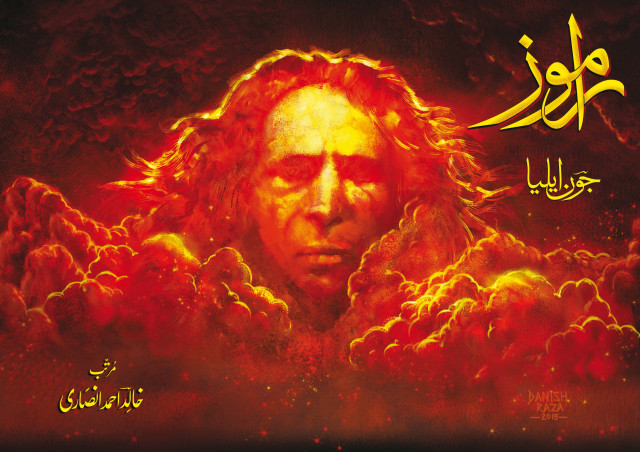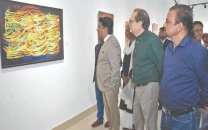Jaun Elia’s new book might change the way poet is known
Entitled ‘Rāmūz’, collection comprises 18 tablets written between 1962 and 1974

The book is accompanied by Danish Raza’s artwork. PHOTO COURTESY: KHALID AHMED ANSARI
There’s a famous anecdote that says he who gains popularity in his own lifetime has to be a writer of below par abilities. While this is still a weak encapsulation of how things really work in the world of literature, it does footnote the sad state of affairs when it comes to the pen and paper, specifically for our times and our context.
One can make the claim that the cult of Jaun Elia gained momentum after he left the world for a better place. For those who knew him in person, he was always there. But for those who didn’t, especially the millennials, a big part was played by his posthumous collections of poetry and prose. In the preface of Shayad, he has already put into words why he thought publishing his works was a bad idea. However, there’s one such friend that he made in 1992 at a spare-parts shop near Waterpump, Karachi, who feels making public Jaun’s writings is something he owes to those who have understood the world through Jaun.
Honouring a legend: Dr Pirzada Qasim reminisces about older, simpler times

After a gap of four years, Khalid Ahmed Ansari is set to release yet another book of Jaun on May 10. Rāmūz is the result of three-and-a-half years of tiring legwork; a collection of 18 alwah (tablets) that Jaun wrote between 1962 and 1974. “I had always heard about this project that Jaun bhai had been working on. Even when you would take it up with him he wouldn’t give a definite answer,” Khalid told The Express Tribune. Earlier called Nayi Aag ka Ehd Nama, this manuscript remained with Khalid for long after Jaun bhai gave it to him in his last years. “Everything was so confusing. I thought it will require a lot of work so I kept it aside and focused on his other collections.”
The 133-page book has now been structured into different chapters, with artwork contributed by Danish Raza. Khalid said this is how Jaun had always wanted it to be, perhaps the reason why the book has been dedicated to Jaun himself.
Rāmūz also comprises a small dictionary that will help the average reader decipher the language. Khalid has sought help from Dr Moeen Nizami, a scholar of Persian associated with Punjab University, in this regard.
He has every reason to believe the book will change the way the world knows Jaun. “These tablets were his magnum opus. He worked on them for years, word by word, verse by verse. And he was never consistent with this project. It was like whenever he got that divine inspiration, he wrote bits,” Khalid said, adding, “I think this will be a slightly heavier dose for those who greatly admire Jaun bhai’s popular work.”
Condolence reference: Tribute paid to Urdu poet Afsar Minhas
Khalid said epics have a historical background that predates the Graeco-Roman and even Arabic literary traditions. “I feel Jaun bhai has played his part in this same process but this work is very different.” He said every tablet has a story of its own and does not bleed into the other. “These tablets are drenched in the typical style of Jaun bhai,” he said, adding, “There’s this nihilism of his about everything … the quest of inventing new meaning.”
Khalid acknowledged the guidance of individuals such as Shakeel Adilzada, H Iqbal and Asad Muhammad Khan with which he was able to sort the manuscript and make sense of it. “Zahida Hina had entered Jaun bhai’s life when he was working on them so I knew she was the best possible resource,” Khalid said. “The book also contains analytical pieces by her, Dr Sahar Ansari and Jaun bhai’s cousin Mumtaz Saeed.”
While Khalid is not interested in a formal and pretentious launch, the Al-Hamd Publications book will be available in the market Tuesday onwards.
On what more of Jaun remains to be seen, Khalid said he has some writings which can be given the shape of a collection of poetry. “It should take me a year or so to put that together. That will be the last book.”
Published in The Express Tribune, May 9th, 2016.
Like Life & Style on Facebook, follow @ETLifeandStyle on Twitter for the latest in fashion, gossip and entertainment.



















COMMENTS
Comments are moderated and generally will be posted if they are on-topic and not abusive.
For more information, please see our Comments FAQ